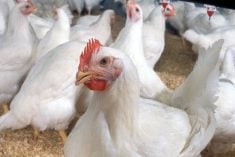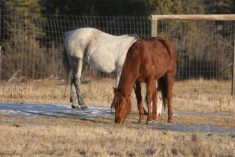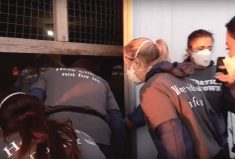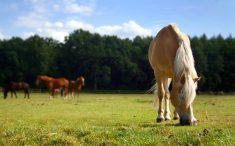Animal rights advocates say a federal bill targeting activists is almost certainly dead, thanks in part, to their legal arguments and “turning” of MPs.
Bill C-205, which proposed to increase penalties for trespassers on agricultural property in the name of biosecurity, died when parliament dissolved prior to the 2021 federal election.
However, before this, it was amended to punish anyone bringing biosecurity risks onto the farm, instead of just trespassers. This, animal rights advocates say, makes it far less attractive to the ag industry and therefore unlikely to be revived in the new parliamentary session.
Read Also

VIDEO: Manitoba’s Past Lane – Jan. 31
Manitoba, 1946 — Post-war rations for both people and cows: The latest look back at over a century of the Manitoba Co-operator
“I’m very skeptical that industry would want that kind of law,” said Jodi Lazare.
Lazare is a professor of animal law and constitutional law at the University of Dalhousie. She spoke during a panel discussion of so-called ‘ag-gag’ laws — laws designed to penalize trespassing, for the purpose of activism, onto farms and other facilities where animals are kept or slaughtered.
Why it matters: Laws designed to keep activists and whistleblowers off farm properties have drawn significant ire from animal rights advocates and sparked court cases in the U.S. and Ontario on the grounds they may infringe on key human rights.
She said she was invited to speak as a constitutional law expert to the Standing Committee on Agriculture and Agri-Food. Lazare ended up submitting her legal opinion in writing due to a scheduling conflict.
No animal rights groups were invited to speak despite numerous requests, she added.
“They chose not to hear from a single one of them. Instead, they heard from (agriculture) industry groups,” Lazare said.
Online parliamentary records indicate no animal advocacy groups presented, though the committee accepted written submissions from several people who appear to be advocates.
The committee also heard from veterinarians and Canadian Food Inspection Agency officials.
Lazare told the conference audience she argued from a perspective of the division of power — that is, if the law falls under federal jurisdiction or if the thrust of the law is actually provincial (or some other) jurisdiction.
She argued that while protecting biosecurity is a legitimate interest of the federal government, by singling out certain people like activists and journalists who are on the property without permission, the law only applies to trespassers. Therefore, the law is about trespassing, not biosecurity.
Food safety and biosecurity are federal jurisdiction but, “the federal government does not have jurisdiction to legislate for property and civil rights and a trespass law is a law that relates to property,” Lazare said.
She also referred to data from animal rights organization Animal Justice, which indicated no disease outbreak on a farm has ever been tied to activism.
Federal chief veterinary officer, Jaspinder Komal, agreed with this assessment during his testimony before the committee. “In scientific literature we haven’t seen much evidence of transmission of disease through these activities,” he said.
Lazare said she concluded the law was about shutting down activism and not about biosecurity or even farm families’ mental health.
“Which may be worthwhile goals, but that doesn’t mean that the federal government can deal with them,” she said.
Lazare said to her surprise, “the committee listened.”
On June 17, NDP MP Alistair MacGregor moved to amend the bill to “make Bill C-205 apply to everyone equally, so that if you are a farmer or farm employee, if you are a transport driver or if you are a protester, if you violate the biosecurity protocols in place on a farm, this law applies equally to you,” parliamentary records show.
MacGregor directly referenced Lazare’s arguments in his speech.
MP John Barlow, who sponsored the private member’s bill, objected.
“We did put this through a rigorous legal counsel review to ensure that there were no jurisdictional or constitutional issues with the bill, and there were none that came back,” he said.
“We also wanted to ensure that this protected the opportunities, let’s say, for whistleblowers, those who are lawfully on a farm… who see something that is below standards, and that this will be reported,” Barlow added. “I believe C-205 as it stands ensures that whistleblowers have that protection to do that important work.”
The committee voted to amend the bill to say “no person” should enter a place where animals are kept in a way that would recklessly expose animals to disease or toxic substances.
The amended bill never had the chance to pass into law as parliament dissolved for the election, but “the suspicion is that, that would have been the end of the story,” Lazare told the conference audience.
Fellow presenter Samantha Skinner, an animal law researcher at the University of Toronto, agreed with Lazare’s assessment. The bill as amended would hold the industry itself accountable which was likely less attractive, Skinner said.
Other activism was also at work.
Kimberly Carroll is director of Animal Justice’s Animal Justice Academy, which trains volunteers to be effective advocates, including how to meet with government officials. At least 5,000 people have enrolled in the academy, she said.
In a panel discussion, Carroll said Animal Justice was concerned the NDP would support Bill C-205. She said she mobilized academy trainees to speak with MPs, including NDP MPs, and to “basically turn them, which we were able to do.”
Several provinces, including Manitoba, Ontario, Alberta and Prince Edward Island, have their own laws related to keeping trespassers out of barns, off agricultural properties, and away from slaughterhouses and animal transports.
Groups representing livestock farmers and processors have generally been very supportive of these laws, saying they’re important for biosecurity, food safety and farmer welfare.
















